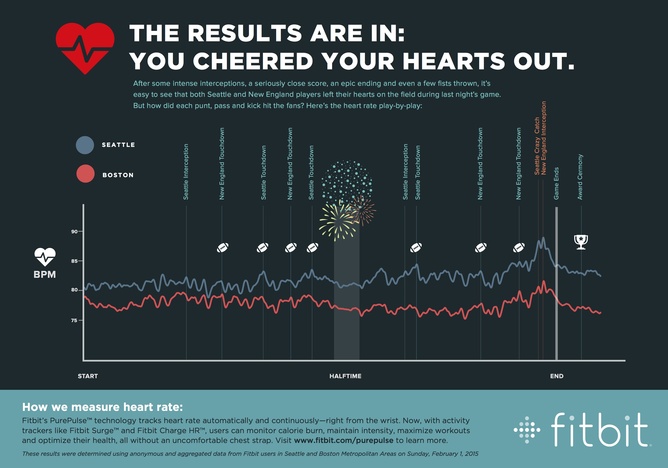
The Superbowl
Fitness tracker company Fitbit have analysed heart rate data from people living in the Seattle and Boston metropolitan areas around the time that the 2015 Superbowl was playing. What they found was an amazing synchronicity of heart beats between the two cities that moved up and down according to events that played out during the game. The people whose data was being analysed were just customers wearing the latest Fitbit devices that are able to monitor heart rate continuously. The fact that the heart rates from two unrelated cities were in almost perfect sync was due to the fact that a large number of the people wearing the devices were watching the Superbowl on TV.
In the US, the Superbowl is one of the most popular events of the year and this year, viewing numbers broke all records with 114 million people watching the game.
The heart rate of the two cities peaked before the end of the game, being an average of 10 beats per minute above the average heart rate in these cities. Interestingly, the half-time show by Katy Perry saw the heart rates in both cities fall gradually. People familiar with the game would be able to identify the highlights from each team’s perspective.
Interestingly, Seattle residents seem to have a higher average heart rate and seemed to respond to events more than people in Boston, even when it was a positive play for the opposing team.
The pluses of population tracking of heart rate data
The ability of companies like Fitbit to analyse continuous physiological data at this scale across the country opens up an enormous range of possibilities in everything from marketing to public health. The Superbowl data would have been noisy because it included a cross-section of people watching the game in a variety of circumstances. Imagine however if this data was constrained to people who had committed to watching the TV in a specific way. The accuracy of the data and the information that would be made available through it would increase dramatically.
From a public health perspective though, we may be able to track outbreaks of disease, such as flu, by looking at abnormal increases in heart rate, indicative of fever. Combined with location data provided by GPS, data could be obtained about how people use urban spaces for activity and through this plan more effectively to support these activities.
The dark side of the data
Of course, for all the good things that could be done with de-identified versions of the data, there is the darker side of misuse of personal data. This misuse doesn’t even have to come from the companies collecting the data but from others potentially accessing it illegally. This is a concern already raised by the US Federal Trade Commission around Apple’s health data framework HealthKit.
The motivation to collect and keep this data however is made clear in Fitbit’s privacy statement where they state “Fitbit may share or sell aggregated, de-identified data that does not identify you”. Platforms like Fitbit collect a very wide range of health and private information that would prove valuable to health insurers and pharmaceutical companies for example.
One possibility that doesn’t seem to have been made available yet is for individuals to enter contracts to voluntarily sell their own data directly to interested parties. At least in this case it would be an individual decision concerning what to do with personal data with the individual benefiting directly.
Discovering love
As far as an analysis of heart rate on Valentine’s day goes, there is another interesting phenomenon whereby couples regulate their heart rates to match each other almost exactly. This seems to be something that the woman in the relationship is able to do. Monitoring a whole nation during Valentine’s evening would certainly allow Fitbit to be able to gather evidence for this.
At an individual level, a contributor to Reddit measured his heart rate during a marriage proposal during a trip to Rome and posted it to the forum. He helpfully annotated the chart with their activities prior to and after the proposal – including eating ice cream immediately prior to popping the question.

Theoretically again, Fitbit could pick out these types of events, especially if both people were wearing the devices. Perhaps however, the public would do well to remove all trackers and maintain their privacy for those special moments.
David Glance does not work for, consult to, own shares in or receive funding from any company or organisation that would benefit from this article, and has no relevant affiliations.
